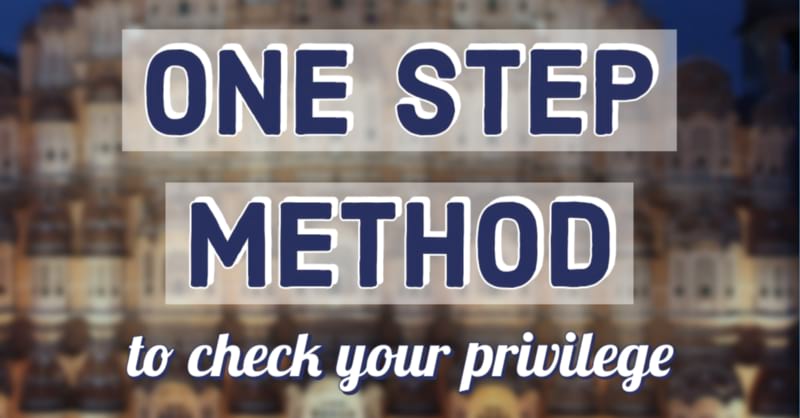One Step Method — to check your privilege
India has over 14 lakh schools, as per the latest UDISE statistics.
Some of these schools are run by the government directly or indirectly, others are run solely by private parties.
Some of these schools are affiliated to the State Boards of Education (eg. Punjab School Education Board or Board of High School and Intermediate Education Uttar Pradesh), others are affiliated to the CBSE, ICSE or IB.

How many of these 1.4 million schools do you think are affiliated to CBSE/ICSE/IB?
Take a guess. Half? A quarter? A tenth at least?
22,000.
Twenty thousand out of fourteen lakhs.
That is one percent.
YOU ARE THE ONE PERCENT.
Weren’t prepared for that were you?
Neither was I. I only learnt this after already working in the education sector for over a year. Privilege is deeply ingrained in our social setup. Everything is designed to either make you forget your privilege, or remind you that you don’t have enough.
It won’t be far from the truth if I said that nearly everyone who you have ever interacted with went to a CBSE/ICSE/IB school. I am sure you did too. Even I did for that matter.
It’s not a ‘bad’ thing per se. Largely speaking, non-government schools offer better education than government schools in most parts of the country. So why wouldn’t you want to study there?
The reason I raise this possibly ‘ground-slipping’ statistic is that I want all of us, internet savvy, English-speaking, privileged folks, to realise all the advantages and entitlements we have been afforded solely because of the accident of birth.
So what is this about?
Wilful ignorance or colluding apathy towards injustice is hugely problematic in itself. I mean to address a portion of it that I have seen occur in the development sector. It has to do with the absolute nonsense that “well-educated” privileged people who occupy positions of power (owing to their social status) spew in the policy space.
For example: some highbrow Ivy League intellectual has managed to convince the top bureaucrat of a certain state in India that teachers will perform better in their classrooms if they installed CCTV cameras in them and made their supervisors carry out spot checks on them every single day. So the government has set up a huge building in the state capital which un-ironically is called the ‘call center’, where each of the 100 odd employees calls a few dozen supervisors across the state every day to check that they are doing their job or not.
If you think this Kafkaesque scene I described above is OK and actually makes sense, I request you to hold tight and keep up with this blog because I plan to dismantle such ‘logical’ notions in future posts.
Coming back to the point. Privileged people, who went to fancy boarding schools and Ivy League universities, often have absolutely no idea what a government school or a primary health centre looks and feels like. Why would they? These poor people never get the time to step up out of their air-conditioned and PPT-filled offices because they are too busy “respecting the hustle”. The ‘management’ team is always removed from the ‘field/implementation’ team because management can only occur when you have nothing to do with the things (or people) you are managing.
And sadly it is these people who wield a disproportionate amount of influence in determining the strategic action for education, health or maternity policy.
I am not suggesting that everyone go through a Gandhi fellow-esque induction period where they spend a few months as a village school teacher before they can assume the role of ‘policy associate’. I don’t think that would help all that much.
What I would suggest instead is that everyone who works in this ‘policy space’ have a certain minimum experience and understanding of the ground realities. This they achieve by routinely interacting with the people involved at the fag end of the policy implementation s(h)tick. And no, visiting one school every six months for 30 minutes, in which you spend 25 minutes sitting in the head teacher’s office – does not qualify.
No two government schools are the same. No two teachers or supervisors are the same. Holding sweeping notions and making blanket statements is plain criminal.
We need to do better.
I hope this alters your world view and behaviour in some tiny way. For the betterment of us all.
Keep up with the Pedagoguey!
Check out @pedagoguey on Instagram – that is where I post bite-sized versions of these blog posts, because sometimes reading a tweet thread is all you have the energy for.
You can read all the Pedagoguey blog posts here: pedagoguey.